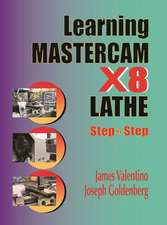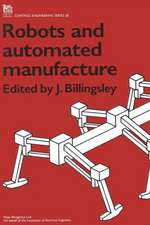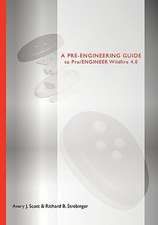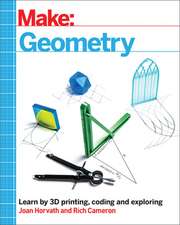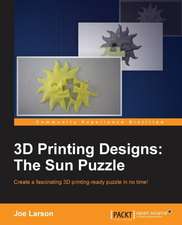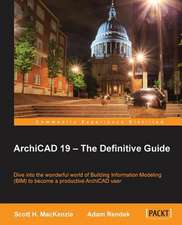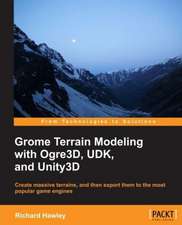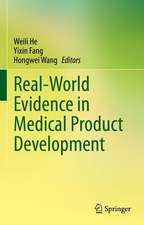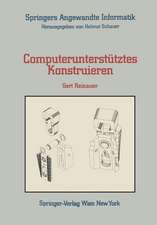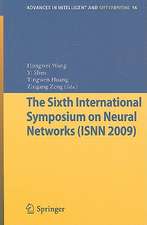Collaborative Knowledge Management Through Product Lifecycle: A Computational Perspective
Autor Hongwei Wang, Gongzhuang Pengen Limba Engleză Paperback – 3 mar 2024
By exploring specific research findings underpinning further CKM research and applications and describing methods related to hot research topics and new research areas, the book appeals to professionals, researchers and graduate students who are interested in knowledge management and related topics and who have a basic understanding of information technologies, computational methods, and knowledge management.
| Toate formatele și edițiile | Preț | Express |
|---|---|---|
| Paperback (1) | 932.77 lei 38-44 zile | |
| Springer Nature Singapore – 3 mar 2024 | 932.77 lei 38-44 zile | |
| Hardback (1) | 1165.69 lei 3-5 săpt. | |
| Springer Nature Singapore – 2 mar 2023 | 1165.69 lei 3-5 săpt. |
Preț: 932.77 lei
Preț vechi: 1165.96 lei
-20% Nou
Puncte Express: 1399
Preț estimativ în valută:
178.48€ • 194.49$ • 150.40£
178.48€ • 194.49$ • 150.40£
Carte tipărită la comandă
Livrare economică 19-25 aprilie
Preluare comenzi: 021 569.72.76
Specificații
ISBN-13: 9789811996283
ISBN-10: 9811996288
Pagini: 283
Ilustrații: XVI, 283 p. 172 illus., 122 illus. in color.
Dimensiuni: 155 x 235 mm
Ediția:2023
Editura: Springer Nature Singapore
Colecția Springer
Locul publicării:Singapore, Singapore
ISBN-10: 9811996288
Pagini: 283
Ilustrații: XVI, 283 p. 172 illus., 122 illus. in color.
Dimensiuni: 155 x 235 mm
Ediția:2023
Editura: Springer Nature Singapore
Colecția Springer
Locul publicării:Singapore, Singapore
Cuprins
Knowledge management through product lifecycle.- The collaborative knowledge management paradigm.- Knowledge modelling methods.- Advanced knowledge retrieval methods.- Knowledge reuse in collaborative knowledge management.- Discussion.
Notă biografică
Dr. Hongwei Wang is a tenured full professor with Zhejiang University and the University of Illinois at Urbana–Champaign Joint Institute where he serves as the vice dean in research and academic lead in intelligent manufacturing. He received the B.S. degree in information technology and instrumentation from Zhejiang University, China, in 2004, the M.S. degree in control science and engineering from Tsinghua University, China, in 2007, and completed the Ph.D. degree in engineering design from the University of Cambridge, in 2010. Prio to joining Zhejiang University, he was a Senior Lecturer in engineering design with the University of Portsmouth, the United Kingdom. His research interests include knowledge engineering, industrial knowledge graph, intelligent and collaborative systems, and data-driven fault diagnosis. His research in these areas has been published in over 120 peer-reviewed papers in well-established journals and international conferences. He has delivered two keynotespeeches and has won four best paper awards in international conferences.
Dr. Gongzhuang Peng is an assistant professor with the Engineering Research Institute, University of Science and Technology Beijing. He received the B.S. degree from School of Automation Science and Electrical Engineering, Beihang University, Beijing, China, in 2012, and the Ph.D. degree from the Department of Automation, Tsinghua University, Beijing, China, in 2018. His research interest concerns knowledge management and smart manufacturing. He has published near 40 peer-reviewed papers in international journals and international conferences, and has won two best paper awards in international conferences.
Dr. Gongzhuang Peng is an assistant professor with the Engineering Research Institute, University of Science and Technology Beijing. He received the B.S. degree from School of Automation Science and Electrical Engineering, Beihang University, Beijing, China, in 2012, and the Ph.D. degree from the Department of Automation, Tsinghua University, Beijing, China, in 2018. His research interest concerns knowledge management and smart manufacturing. He has published near 40 peer-reviewed papers in international journals and international conferences, and has won two best paper awards in international conferences.
Textul de pe ultima copertă
This book not only presents the state-of-the-art research on knowledge modelling, knowledge retrieval and knowledge reuse, but also elaborates the Collaborative Knowledge Management (CKM) paradigm and the architecture for the next generation of knowledge management systems. Although knowledge management has been extensively studied, particularly in the fields of business management and engineering design, there is a lack of systematic methodologies for addressing the integrated and collaborative dimension of knowledge management during the collaborative process of designing and developing complex systems, products, processes and services. The rapid development of information technologies, together with their applications in engineering and management, has laid the foundation for a Collaborative Knowledge Management (CKM) paradigm. The book specifically discusses this paradigm from a computational perspective.
By exploring specific research findings underpinning further CKM research and applications and describing methods related to hot research topics and new research areas, the book appeals to professionals, researchers and graduate students who are interested in knowledge management and related topics and who have a basic understanding of information technologies, computational methods, and knowledge management.
By exploring specific research findings underpinning further CKM research and applications and describing methods related to hot research topics and new research areas, the book appeals to professionals, researchers and graduate students who are interested in knowledge management and related topics and who have a basic understanding of information technologies, computational methods, and knowledge management.
Caracteristici
Provides a comprehensive and up-to-date introduction to Collaborative Knowledge Management (CKM) Reviews the state-of-the-art research on knowledge management concepts and theories Describes in detail novel methods for knowledge modeling, knowledge retrieval, and knowledge reuse
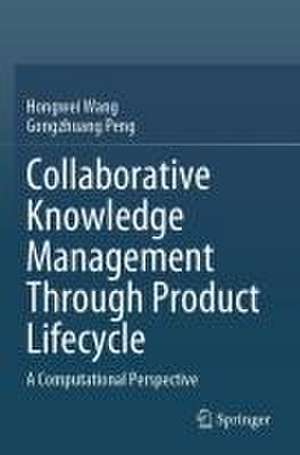
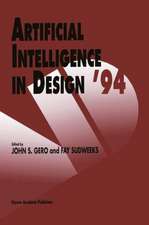
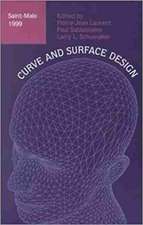
![Solidworks for Technology and Engineering [With CDROM]](https://i1.books-express.ro/bt/9780831134518/solidworks-for-technology-and-engineering-with-cdrom.jpg)

